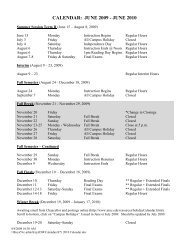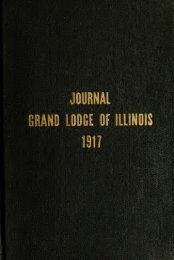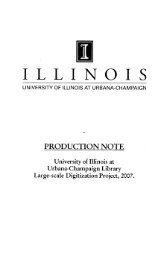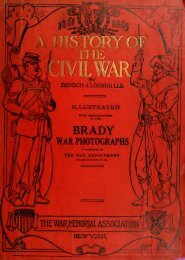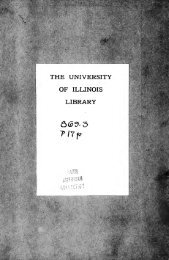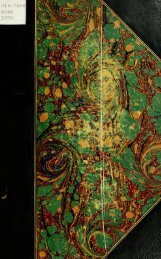The House of Morrell; with a foreword by William ... - University Library
The House of Morrell; with a foreword by William ... - University Library
The House of Morrell; with a foreword by William ... - University Library
You also want an ePaper? Increase the reach of your titles
YUMPU automatically turns print PDFs into web optimized ePapers that Google loves.
tccincd liiifhly meat from buffalo, elk, caribou and moose. We know they<br />
made pemmican from the lean Hcsh <strong>of</strong> the buftalo or venison, sun-dried and<br />
pounded.<br />
Perhaps the earliest settlers secured some <strong>of</strong> their ideas for handling<br />
meat from the Indians but it is also known they brought <strong>with</strong> them some<br />
<strong>of</strong> the practices common in Europe, curinjr, smoking and packing meats.<br />
<strong>The</strong> earliest authentic record <strong>of</strong> importation <strong>of</strong> swine into this country<br />
is dated 1538 and covers swine brought from Cuba to Florida <strong>by</strong> Ferdinand<br />
de Soto. Cattle and hogs were delivered to Newfoundland and Nova<br />
Scotia <strong>by</strong> Portuguese traders in 1^53. Although some cattle had reached<br />
Virginia before 1609, the first big shipment arrived in 1610. <strong>The</strong> first<br />
sheep came from England to Virginia in 1609.<br />
Each group <strong>of</strong> settlers brought in the domestic animals natural to their<br />
land. And as they pushed westward in search <strong>of</strong> a home, they took along<br />
<strong>with</strong> them their sheep, hogs and cattle.<br />
Meat as a food product was so vital, so important to those first settlers<br />
that, in order to protect valuable animals which had been so carefully<br />
transported across the sea, an edict was published which forbade the killing<br />
<strong>of</strong> domestic animals <strong>of</strong> any kind. Of course there was reason behind<br />
this edict and it served its purpose admirably. Because <strong>of</strong> it farmers had<br />
to protect their domestic animals and use them for breeding stock, and in<br />
this manner herds increased rapidly.<br />
<strong>The</strong> penalties set up for infractions against the edict were so severe<br />
that no one willingly disobeyed them. <strong>The</strong> owner could be sentenced to<br />
death; an accessory stood the chance <strong>of</strong> having his hand burned or losing<br />
an ear, while anyone concealing product handled in direct violation <strong>of</strong> the<br />
law might find himself sentenced to a 24 hours' whipping. Harsh though<br />
these penalties may have been, even for the seventeenth century, they<br />
served to protect the meat needs <strong>of</strong> the colonists, and herds were built up<br />
in good measure. And the country was ready for the beginnings <strong>of</strong> the<br />
meat packing industry.<br />
Settlers in the New England states found their dairying, cattle feeding,<br />
and hog raising operations were becoming increasingly larger. In the valley<br />
<strong>of</strong> the Connecticut river an important cattle industry had developed.<br />
Market days came into existence as a means <strong>of</strong> disposing <strong>of</strong> surplus stock<br />
and providing stock for butchering purposes. Rudolf Alexander Clemens,<br />
in his American Live Stock and Meat Indus try, quotes a piece from the<br />
Country Gentleman <strong>of</strong> i860 which gives a pretty good idea <strong>of</strong> what one<br />
<strong>of</strong> these market days was like. He writes:<br />
"Thursday <strong>of</strong> every week which <strong>by</strong> common consent and custom is the<br />
market day, changes the generally quiet village <strong>of</strong> Brighton into a scene<br />
<strong>of</strong> bustle and excitement. At early morning the cattle, sheep, etc., are hurried<br />
in and soon the morning train from Boston, omnibuses, carriages and





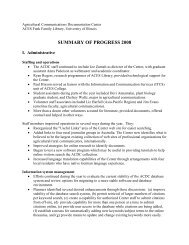
![La musa galante [microform] - University Library](https://img.yumpu.com/50760818/1/190x222/la-musa-galante-microform-university-library.jpg?quality=85)
